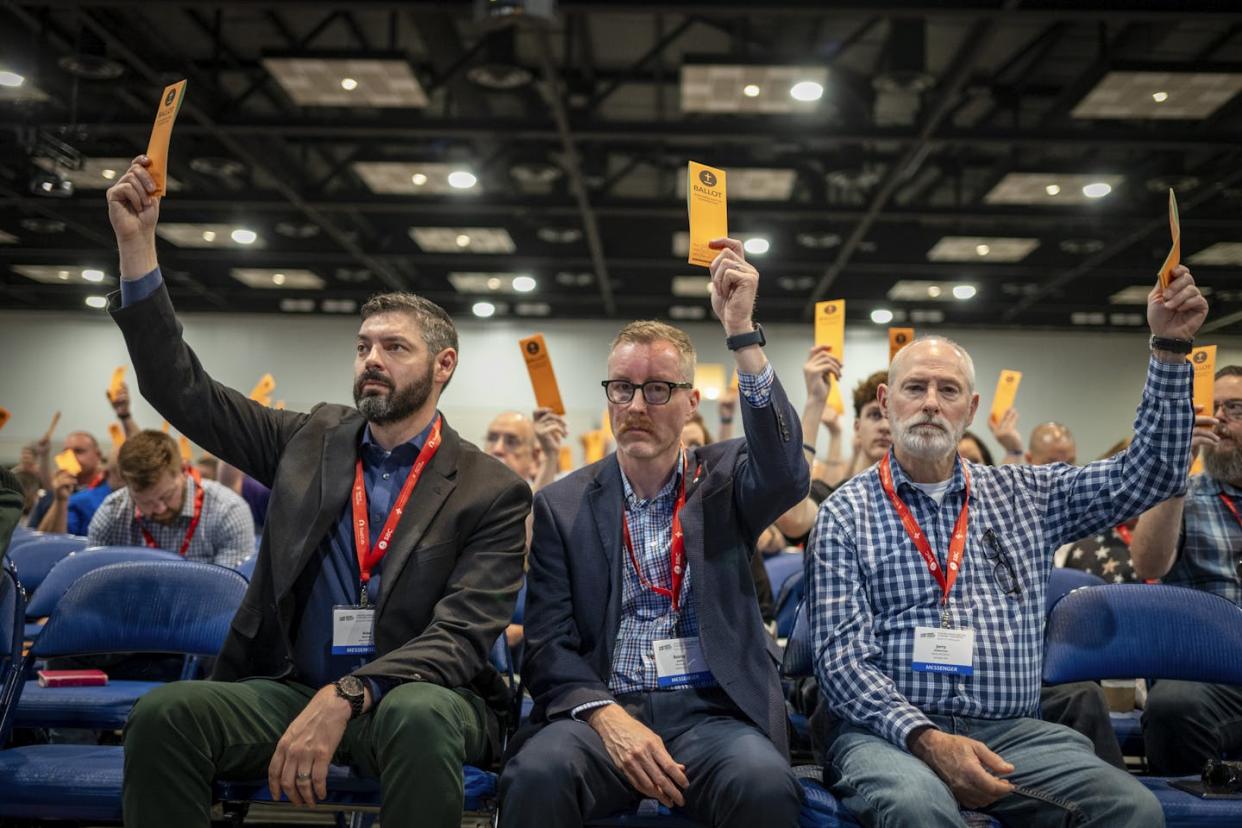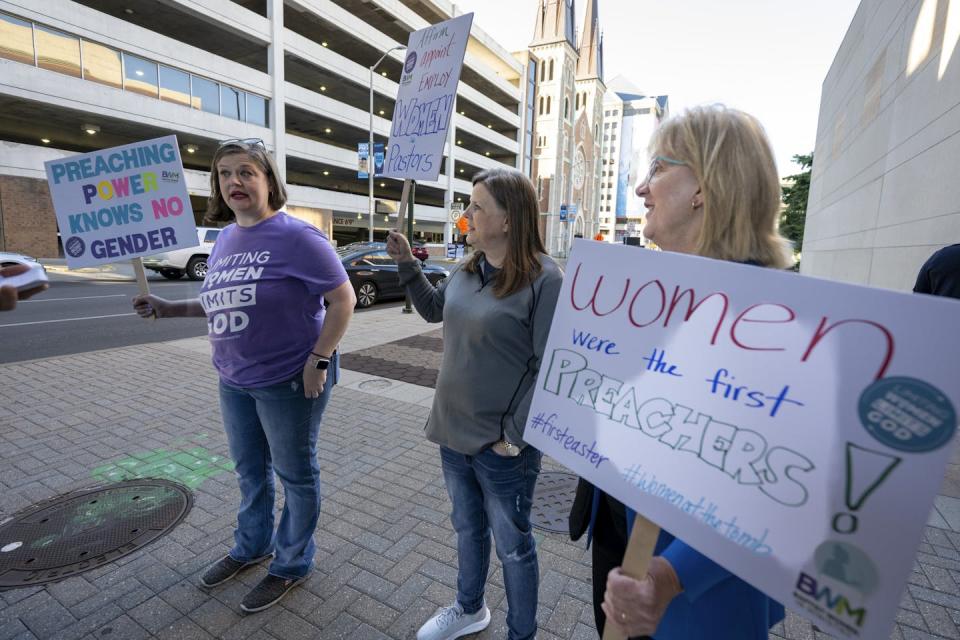Southern Baptists may have rejected a constitutional amendment opposing female pastors, but that does not mean they are changing their views on women’s leadership in church

The recent annual meeting of the Southern Baptist Convention saw a number of motions related to women. The Conversation asked Susan Shaw, a gender and sexuality studies scholar who studies Southern Baptist women, to explain the votes and other developments in the nation’s largest Protestant denomination.
The Southern Baptist Convention rejected a proposal that would explicitly state that only men could be pastors. Does that mean that the SBC is changing and becoming more accepting of women in leadership roles?
Absolutely not. The day before the vote on the denomination’s proposed constitutional amendment to exclude churches with women serving in pastoral roles, the convention expelled the First Baptist Church of Alexandria, Virginia, for its views that women can serve as pastors. That vote wasn’t even close at 6,759 to 563.
How many female pastors are in the SBC at the moment? Could you also explain some of the history of the opposition to women serving in leadership?
There are somewhere between 1,000 to 1,800 women serving with the title of pastor in Southern Baptist churches. Few, if any of these women, are senior pastors. Instead, they are associate pastors, youth or children’s pastors, women’s pastors or other kinds of pastors, all working under the supervision of a man who is senior pastor.
The SBC passed a resolution in 1984 rejecting women as senior pastors.
While resolutions are not binding on local churches, the proposed constitutional amendment would have defined a church as in cooperation with the SBC only if it “[a]ffirms, appoints, or employs only men as any kind of pastor or elder as qualified by Scripture.”
In order to amend its constitution, the convention must first approve any proposed amendment at an annual meeting and then confirm it with a final vote at the following annual meeting. That vote requires a two-thirds supermajority approval for the amendment to become part of the constitution. The amendment on women pastors passed in 2023 but failed this year because it received only 61% of the vote.
Some of those who opposed the amendment argued the convention has already spoken on the issue, has mechanisms to address churches with women pastors, and therefore does not need to amend its constitution. Nothing in this argument suggests support for women, and, in fact, those opposing the amendment often affirmed their support for the denomination’s stance against women pastors.

For many Southern Baptists, the exclusion of women from being senior pastors does not prevent their participation in other pastoral roles that do not have the supervisory authority of the senior pastor or require ordination. That certainly was the language of the promoters of the 1984 resolution, and the move to expel churches that have women in pastoral roles other than senior pastor, as they recently did in Alexandria, Virginia, reaches beyond the intent of the earlier resolution.
Southern Baptists also highly value what they call “the autonomy of the local church.” This deeply held Baptist belief means that each local church is self-governing and is not in any way controlled by the SBC. By expanding its exclusion of women from pastoral roles, the SBC may have been perceived as infringing on the autonomy of the local church.
In 2023, the Southern Baptist Convention refused to welcome Saddleback Church back into its fold after its ouster earlier in the year for having women pastors. What do you think this vote will change?
I don’t think the vote will change anything. While Saddleback’s women pastors were not senior pastors, they were ordained, and the church did affirm women’s ability to hold any pastoral role. We can see from this year’s expulsion of First Baptist Alexandria that the SBC will continue to purge churches that affirm women in all pastoral roles.
The only thing this year’s vote showed us is that a significant minority of messengers – Southern Baptists’ term for delegates to the SBC annual meeting – do not want to meddle with the convention’s constitution.
At the same time, the SBC voted to oppose the use of in vitro fertilization. Could you explain this vote and SBC’s historical views on fetal personhood?
This resolution extends Southern Baptists’ rejection of any procedure that terminates fetuses or embryos. The resolution sympathizes with infertile couples but argues that because embryos are often stockpiled and destroyed following a successful implantation that the process is ultimately the “destruction of embryonic human life.”
In the 1970s, before the fundamentalist takeover of the SBC in the 1980s and early 1990s, Southern Baptists generally opposed abortion on demand, but they also worried about government interference in women’s decision-making about their own bodies.
In the 1980s, the convention made a hard right turn with the goal of having abortion outlawed again. The SBC’s language changed from “fetal life” to “pre-born” or “unborn” persons. Now we see the SBC talking about embryos as full human beings and advocating “for the government to restrain actions inconsistent with the dignity and value of every human being, which necessarily includes frozen embryonic human beings.”
What else was significant about the meeting?
Despite pressure in recent years for the SBC to do something about its sexual abuse problem, the convention has repeatedly failed to make significant progress, especially on its long-awaited database to track offenders. This year, again, messengers voted to pass various abuse reforms, but survivors found themselves disappointed with how little change is really happening. Significant change, it seems, always fails due to concerns about insurance and liability.
Taken together, the vote against the constitutional amendment, the resolution opposing in vitro fertilization, and the lack of action on sexual abuse reform underline that nothing in the denomination’s ultraconservative beliefs about women is changing.
This article is republished from The Conversation, a nonprofit, independent news organization bringing you facts and trustworthy analysis to help you make sense of our complex world. It was written by: Susan M. Shaw, Oregon State University
Read more:
Abortion bans are changing what it means to be young in America
How women in the Southern Baptist Convention have fought for decades to be ordained
Susan M. Shaw does not work for, consult, own shares in or receive funding from any company or organization that would benefit from this article, and has disclosed no relevant affiliations beyond their academic appointment.

 Yahoo News
Yahoo News 
